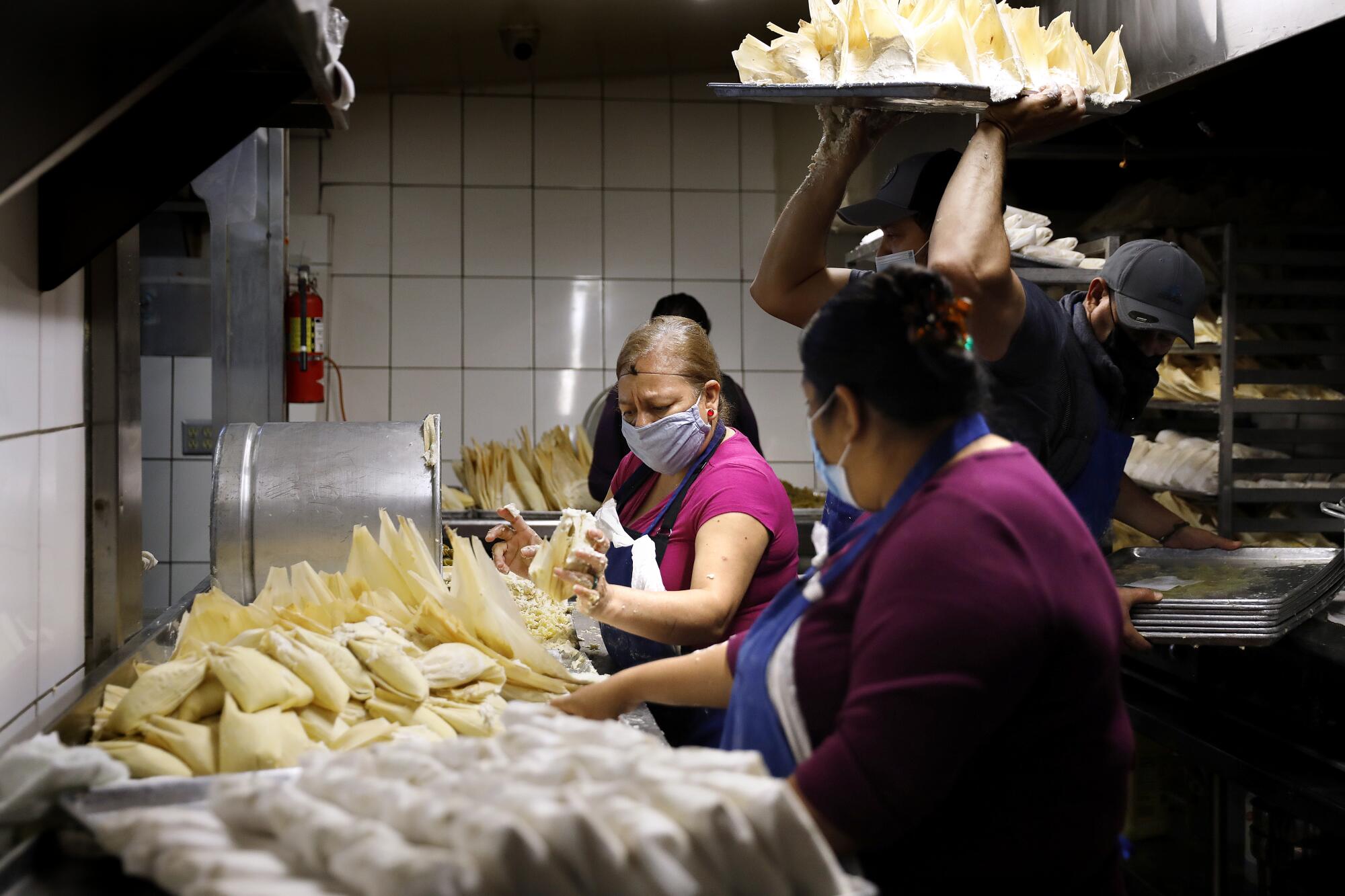
- Share via
It looked like business as usual on the assembly line.
Four men behind the counter of Tamales Liliana’s in Boyle Heights were scooping up masa with their hands and smearing it on opened corn husks. Six women then filled them with slits of green chile and cheese before folding and wrapping them in baking paper. Nearby, Juan Manuel Santoyo took stock of the ritual.
“I spend a good amount of time making tamales to sell during the week of Christmas,” the 67-year-old restaurant owner said. “It’s what we rely on to get us through the year.”
For many Mexican and Central American families, a Christmas without tamales feels like culinary heresy. The last month of the year is filled with Latino holiday traditions and festivities such as tamaladas (tamale-making parties), the Feast Day of Our Lady of Guadalupe and Las Posadas, a reenactment of Mary and Joseph trying to find lodging in Bethlehem.
They are events that traditionally involve tamales — and what has become practically a four-letter word for health officials in this time of seething pandemic: large gatherings.
For Santoyo, the signs are pointing to smaller celebrations that are bad for business, if not the spread of the coronavirus.
Get the Latinx Files newsletter
Stories that capture the multitudes within the American Latinx community.
You may occasionally receive promotional content from the Los Angeles Times.
“Our tradition is to gather with family. And you may have four to five families at a home and so you might order 20 tamales,” he said. “But that’s not happening. You’re going to celebrate with your own family and, rather than ordering 20 tamales, you might order five.”
On average, Santoyo sells up to 40,000 tamales on Thanksgiving Day, but this year he saw a drop in sales.
“I don’t even think I reached 20,000,” he said.
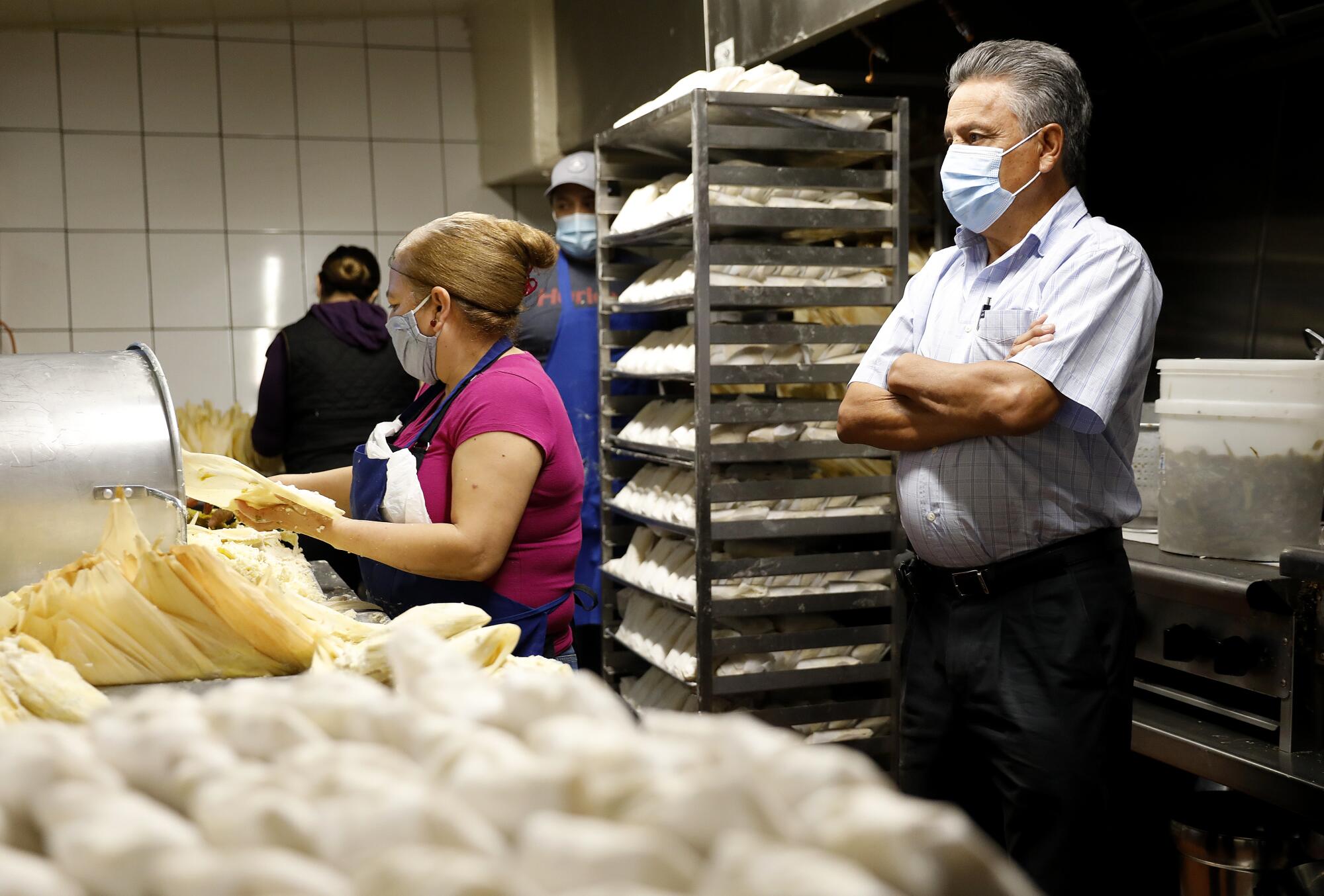
Call it the unscientific “tamale poll.”
Tamaleros say they aren’t selling the same number as they did in years past, possibly meaning fewer family gatherings this year. And while some still hope for a Christmas miracle, others say they’re pessimistic given the skyrocketing number of COVID-19 cases.
In Koreatown, holiday music blared from a tiny speaker sitting by the front entrance of Amalia’s, a Guatemalan restaurant. But the sadness comes in waves, said owner Milbet Del Cid, whose eyes water when she sees the vacant dining room or thinks about the seven employees she laid off.
“My mom opened this business in 1994, and we’ve been through a lot. We’ve had recessions, so many things,” she said. “I sat down and started to think that for the first time in my life, I feel that we’re possibly going to have to close.”
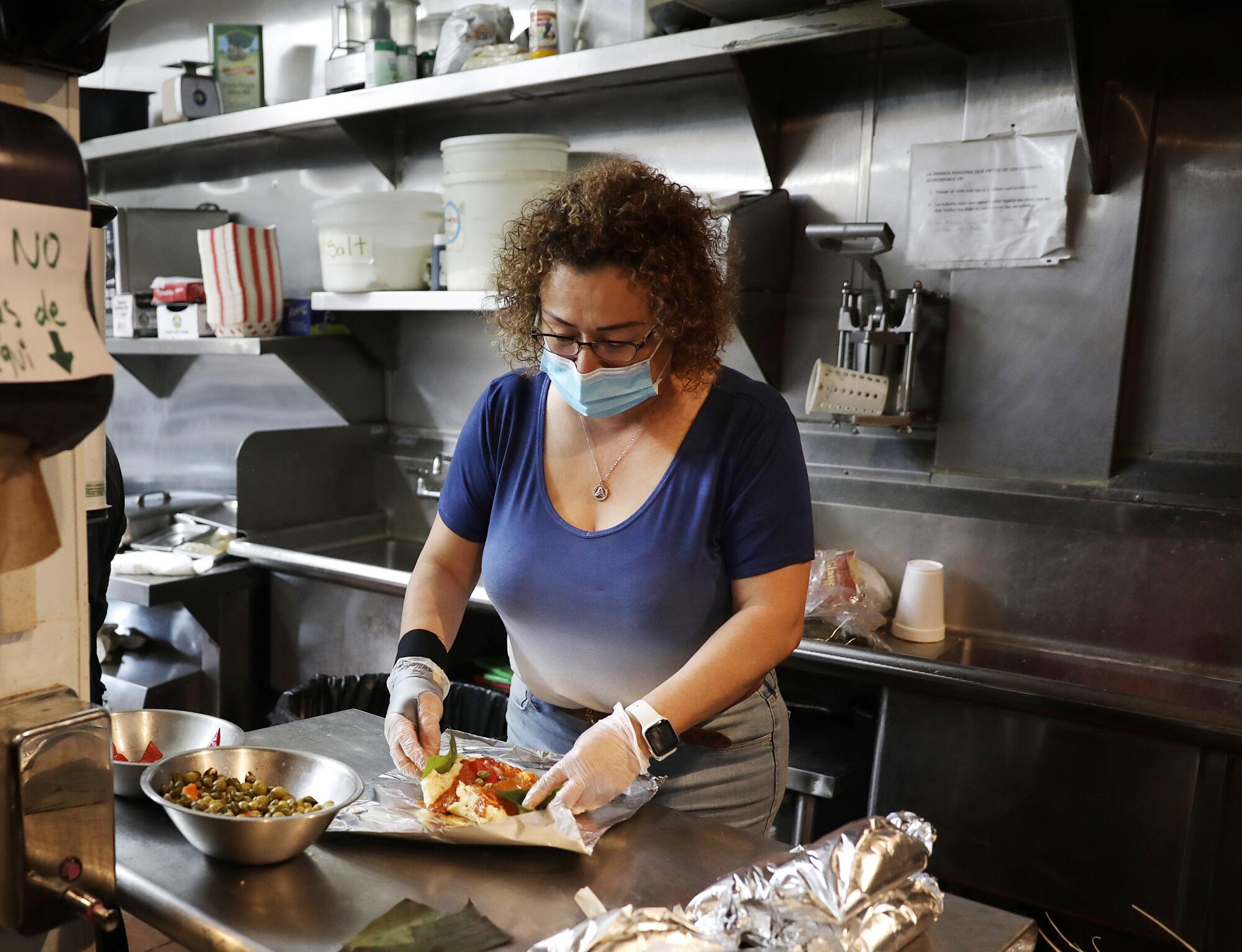
Inside the small kitchen, Telma Lopez, 58, used a metal spoon to scoop masa from a bucket and place it on a banana leaf lying on a sheet of tin foil. She poured a special sauce over it and placed a piece of chicken in the tamale. Lopez then handed it to Del Cid, who added olive and a slit of red bell pepper before wrapping the tamale and placing it in a large pot.
Around this time in a normal year, said Del Cid, 51, she would have orders for 1,500 tamales. By Christmas, that would be up to 3,500, if not more. Since Thanksgiving, she’s received orders for only about 100 tamales. Del Cid said she’s tried contacting her usual customers but has had no luck reaching them.
“The largest order was for 25 tamales,” she said. “I’ve been here thinking: Lord, help … me stay strong. Help us.”
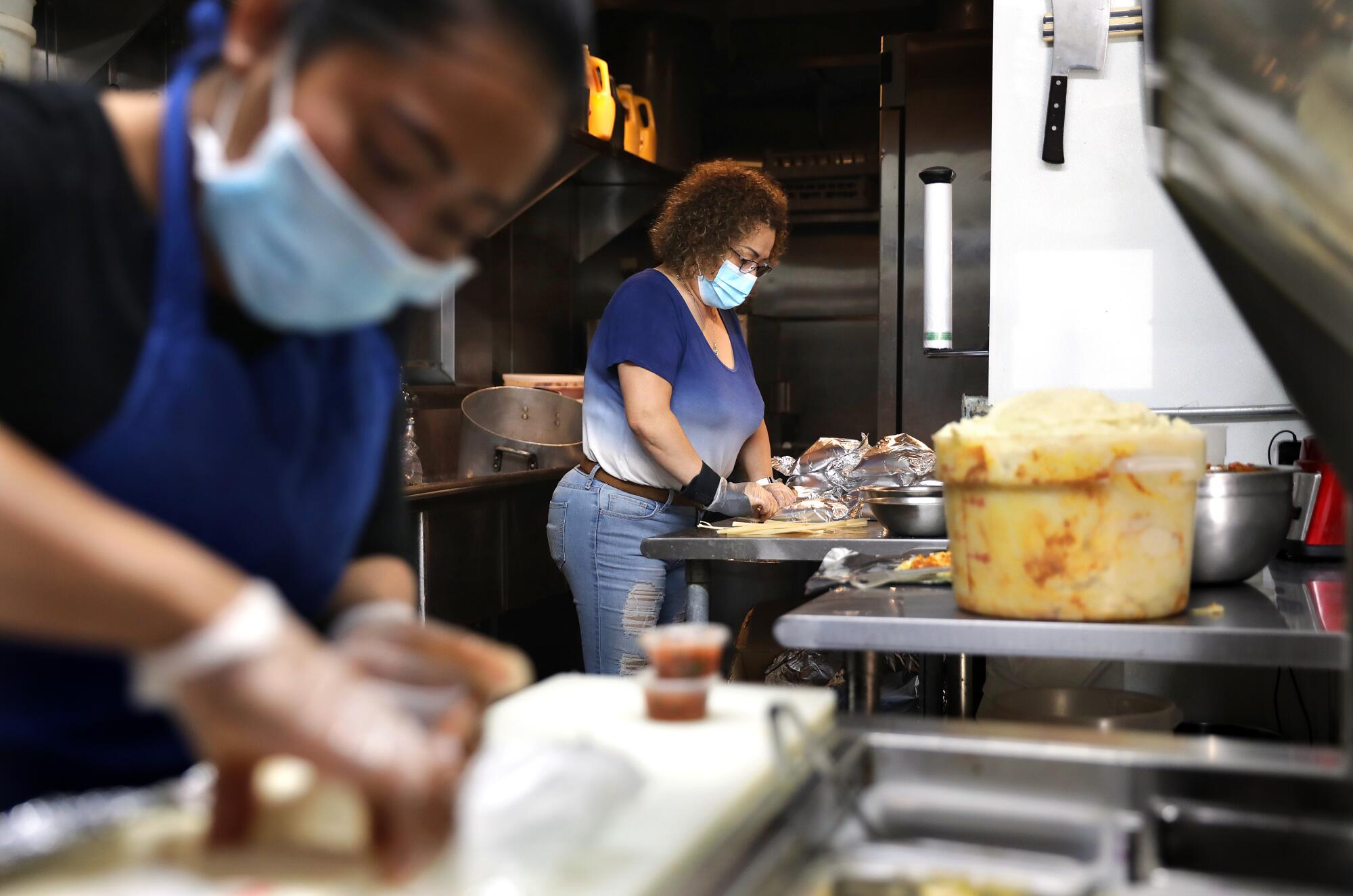
Santoyo has had to cut employees’ hours, though he hasn’t laid off any.
Born and raised in Zacatecas, Mexico, Santoyo arrived in the United States in 1990 with his wife and $50 in his pocket. He worked for six months at his uncle’s bakery near Cesar E. Chavez Avenue and Ford Boulevard as a way to get settled. Soon he began selling tamales on the street.
He saved and eventually made his first major business investment— a $3,500 cart. He and his wife later moved into a room at a friend’s house in South Gate, where they prepared their tamales out of the garage to sell in East Los Angeles.
“My wife and I would take turns and sleep for two hours each, then go back out to sell tamales,” he said.
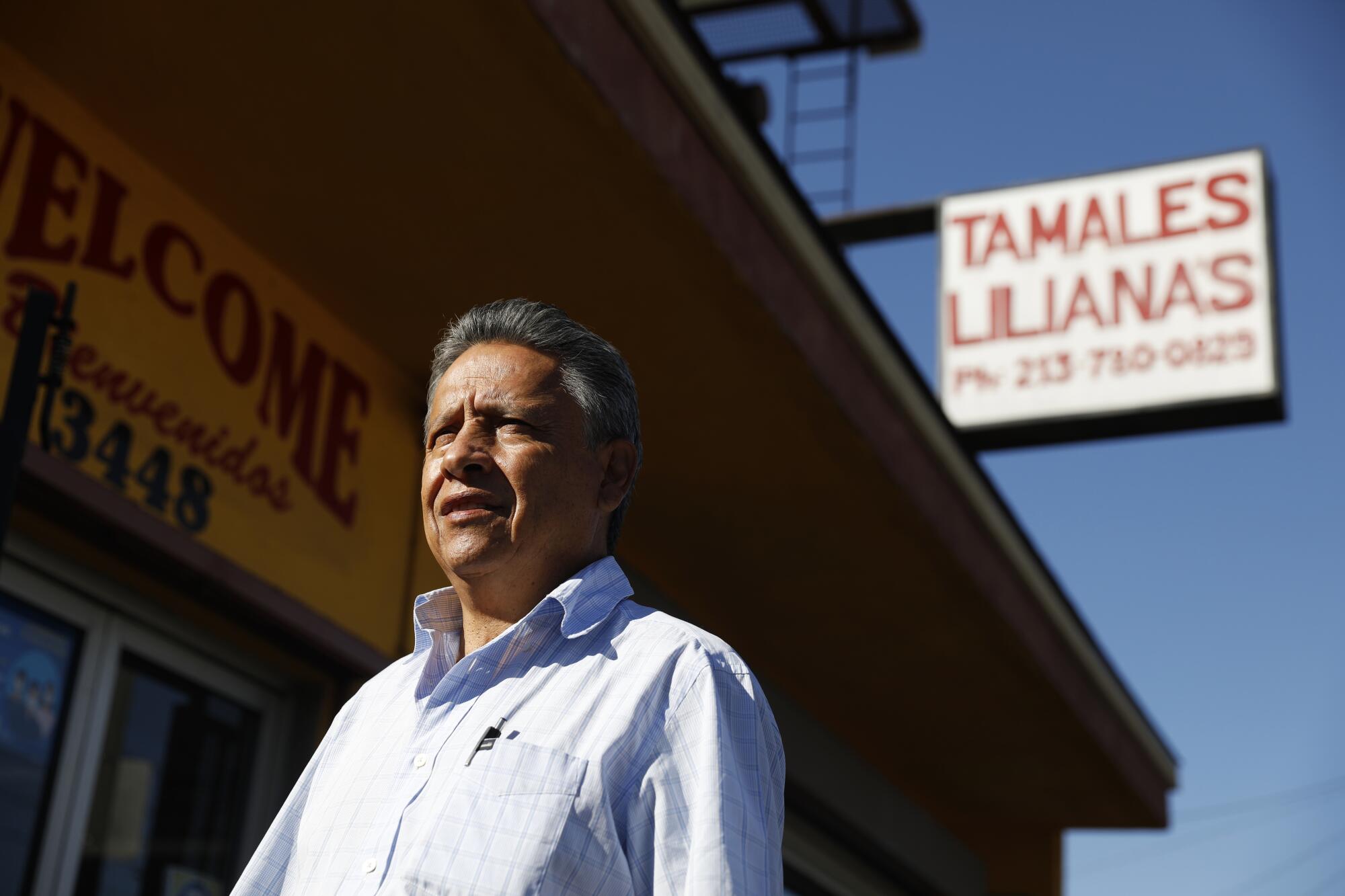
The sacrifice paid off the following year when he opened his first restaurant at First and Indiana streets, naming it after his daughter, Liliana.
In 1998, he opened a second location on Cesar E. Chavez Avenue and moved eight years later to a larger building on the same street.
In all that time, the success of his business has been inextricably linked to the families that purchase tamales for Christmas and New Year. He also receives large orders from schools, corporations and churches hosting religious or holiday events.
“I mostly depend on families who get together and order two to three dozen tamales,” Santoyo said. “But they’ve prohibited people from gathering and as a result, I won’t have any of those sales.”
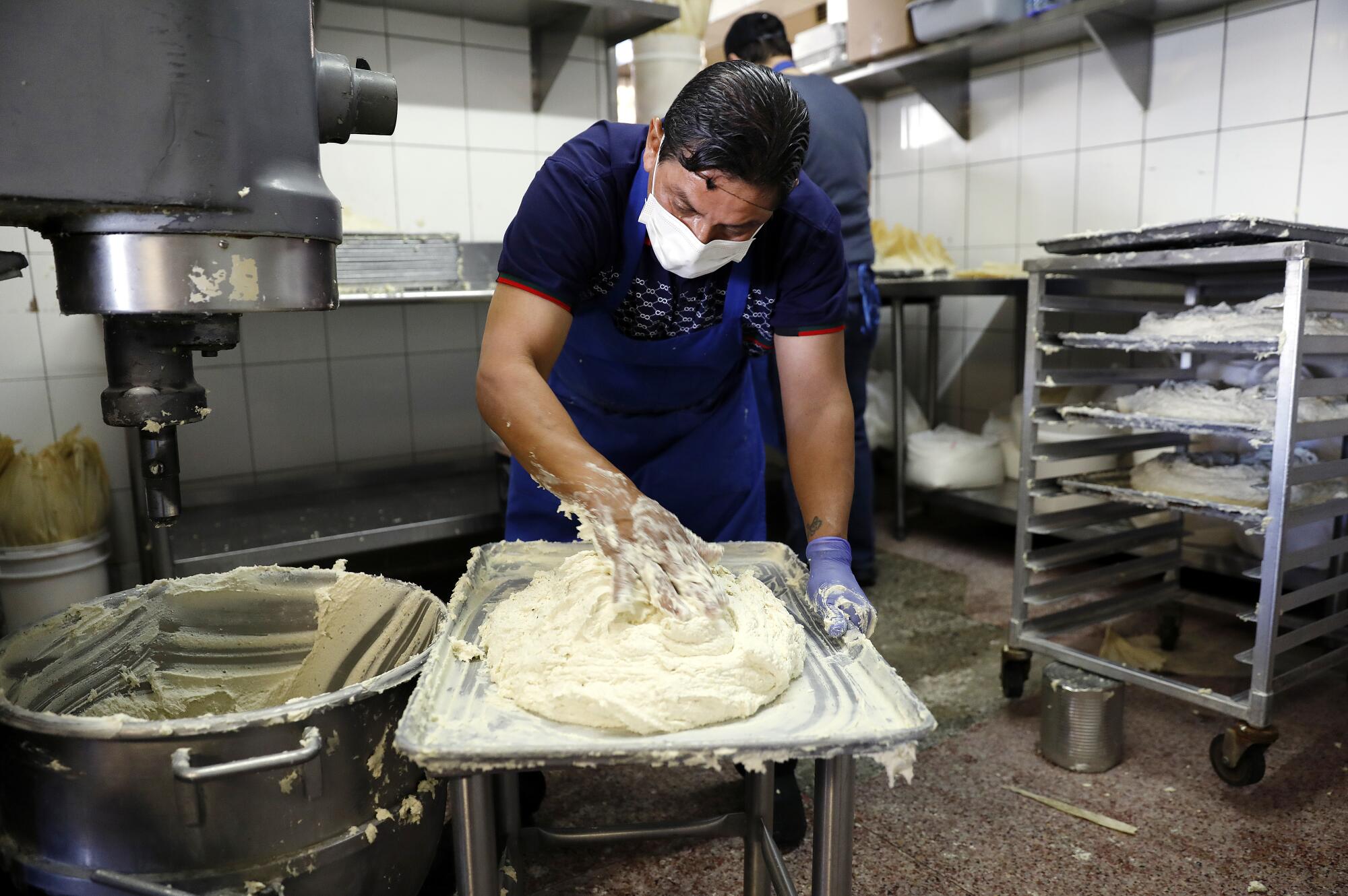
Some people who sell out of brick-and-mortar shops express frustration when they see street vendors selling tamales not far from their hobbled businesses. But in places like MacArthur Park, street vendors say the pandemic is putting the “mal” in tamale. They say most of their money goes to rent and bills, and they are left with little. The pandemic has made their margins narrower than ever.
“People are staying home, and if there’s no one around then we’re not selling anything, ” said Pancho Lopez, 43. “Everyone is being impacted by the coronavirus.”
More than 20 miles away in Pacoima, Alicia Esparza, 60, owner of Rosy’s Tamales, said there’s been a slight change this holiday season. Business isn’t booming, but it hasn’t declined precipitously.
“It’s been slow, I can tell you that,” she said.
Her business typically sees individual customers coming in to buy one or two tamales. She does big orders only Christmas week, and she often requires in-person purchases because sometimes customers fail to pick up their orders.
“I’m not sure how it will be this Christmas,” Esparza said.
For Amapola Deli and Market, which is famous for its masa and has locations in cities with large Latino populations, business has been surprisingly healthy.
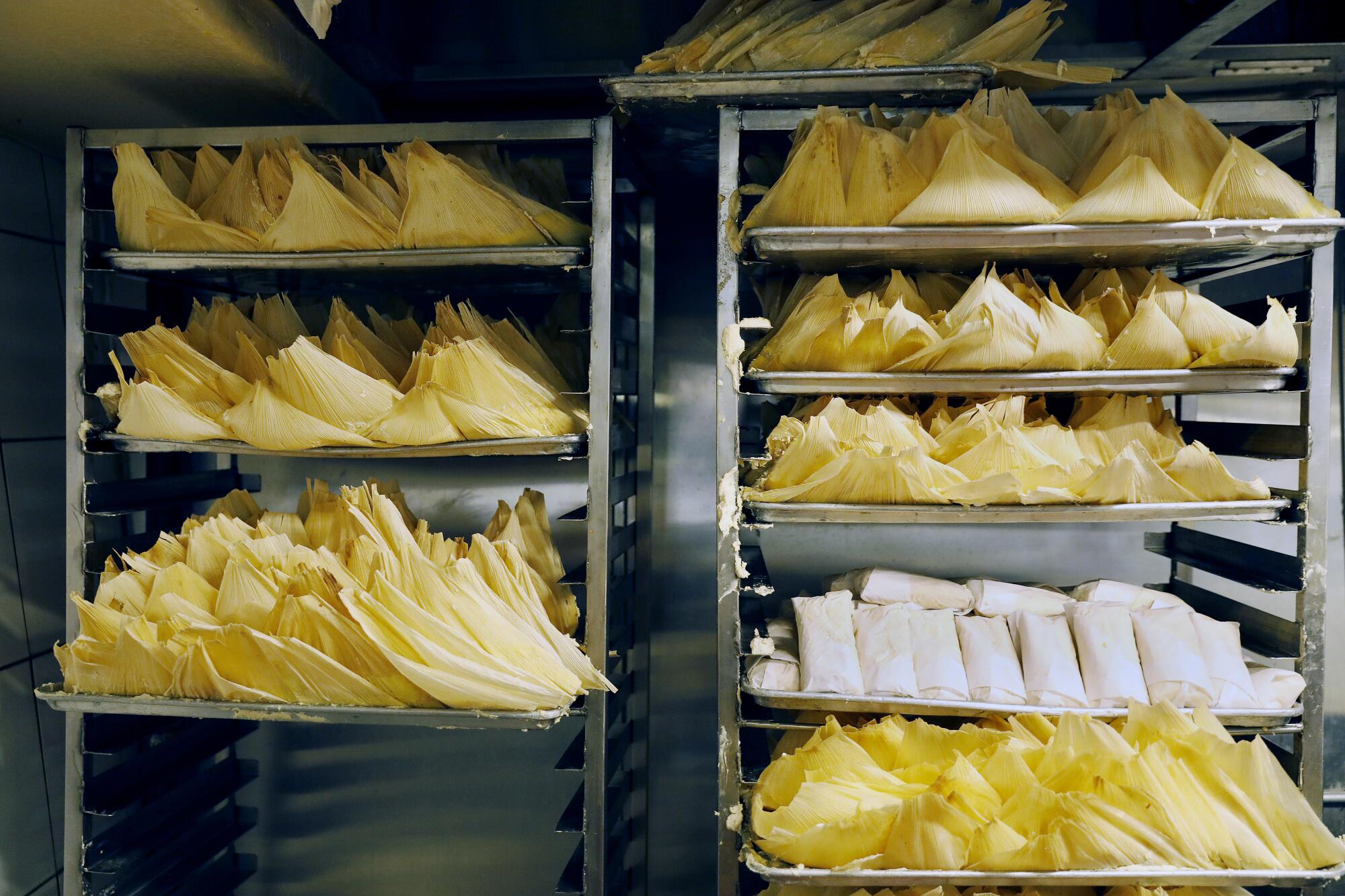
“Thanksgiving was our dry run and we actually did well,” said Carlos Galvan Jr., vice president of Amapola. “Everything that is tied to tamales: the ingredients, the meats, the spices, we were seeing some increases in all that.”
He said the company saw a 10% boost in sales, attributing it to grocery sales as well as tamaleros who sell on the street. Galvan Jr., 54, also believes some people suffering financial hardships know that they can make plenty of tamales to tide them over for a while.
When the sales were up during Thanksgiving week, Galvan began to hope that December would be a promising month. But with rising coronavirus infections, hospitalizations and deaths came tighter business restrictions.
“It couldn’t have come at a worse time for us,” he said.
He said the stores now have to consider capacity issues while continuing to keep employees safe. He also doesn’t know if customers will show up and stand in line this year given the pandemic. He hopes the weather will be kind too.
Galvan knows tamale-related heartache well.
In 2016, a bad batch of masa ruined Christmas meals for hundreds of Amapola customers. The problem was that genetically modified corn used for fuel had been mixed in with the corn used to make the masa.
“That was a bad year, but … nothing compared to what we’re dealing with now,” Galvan Jr. said. “There’s so much uncertainty this year.”
Outside Tamaleria La Doña in Compton, more than a dozen people stood in line to get inside and purchase batches of tamales.
Monica Rodriguez, 35, said she planned to still gather with family regardless of the pandemic. She said most of the family — eight of them — live in the same house, but she still plans to visit her sister-in-law.
“I don’t care about what’s happening, I’m still going to go see her,” she said. “We’ll probably exchange gifts real quickly.”
Just ahead of her in line was Esther Medina, 33, owner of a flooring business. She said every year she comes to buy tamales to feed day laborers and the poor. She also buys some for the company’s annual Christmas party and family holiday gatherings.
But this year, there’s little to celebrate. Her company hasn’t seen much business and her workforce dropped from 18 to four people; three of the employees have recently tested positive for the coronavirus.
She said she’s going to spend Christmas only with immediate family this year.
“Normally I’d order about 15 to 20 dozen tamales. This time I’m just getting five dozen,” she said. “The tamale is like the taco. It’s just something you share. It means family reunion to me.”
More to Read
Sign up for Essential California
The most important California stories and recommendations in your inbox every morning.
You may occasionally receive promotional content from the Los Angeles Times.











